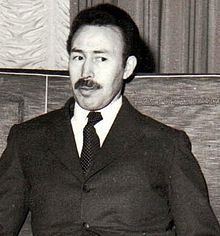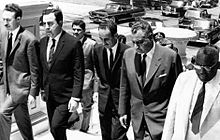Houari Boumedienne
Houari Boumedienne or Huari Bu Madyan ( Arabic هواري بومدين, DMG Hawārī Bū-Madyan , Central Atlas Tamazight ⵀⵓⵡⴰⵔⵉ ⴱⵓⵎⴷⵢⴰⵏ Hewari Bumedyan ; real name Mohammed Boukharrouba ; * August 23, 1927 in Guelma ; † December 27, 1978 in Algiers ) was an Algerian politician. He was Algerian head of state from 1965 to 1978.
Life
At the age of 12, Boumedienne experienced the massacres that took place in his home region of Guelma. When the end of World War II was celebrated in Europe on May 8, 1945, demonstrations for the independence of Algeria were held on the streets of Guelmas and Setifs. These demonstrations resulted in a great wave of violence in which 102 European settlers and around 15,000 to 20,000 Algerians were killed. The bloody suppression of the unrest by the French military shaped Boumedienne's youth and awakened national aspirations in him.
After Boumedienne had studied theology at the Islamic Institute in Constantine and at the Ez-Zitouna-Mosque / University , he attended the al-Azhar University in Cairo from 1951 , where he later also worked as a lecturer. During his stay in Cairo, Boumedienne received guerrilla training. After studying he joined the National Liberation Front (FLN) and chose his battle name after the Sufi Abu Madyan , who is called Sidi Bu Madyan in the Maghreb. In the FLN he quickly gained influence as a commander during the Algerian War. In 1957 Boumedienne was entrusted with the military direction of Wilayat 5, one of the six military regions of Algeria, where he was mainly responsible for the arms deliveries from Morocco . In 1958 he became chairman of the newly formed inter-ministerial war committee (Comité Interministériel de la Guerre, CIC). In 1960 he became chief of staff of the FLN. After the FLN victory in 1962, he became Secretary of Defense in the Ahmed Ben Bella government .
On June 19, 1965, with the support of the army , he overthrew President Ahmed Ben Bella in a coup and then united in his person the post of government and head of state . Politically he represented a socialism oriented towards Islam and strengthened the industrialization of the country with the help of the oil revenues . Its economic success led to a high reputation in the Arab countries. After a constitutional amendment, Boumedienne was officially elected president in 1977. From 1973 to 1976 he was Secretary General of the Non-Aligned Movement .
He died a year later after a 39-day coma of Waldenström's disease , a malignant lymphoma for which he had previously been treated unsuccessfully in Moscow.
Foreign policy
Relationship with France
Boumedienne was foreign minister before his coup against Ben Bella. After his coup d'état, Algerian-French relations deteriorated because Algeria reduced economic ties with France in favor of new trading partners such as the Federal Republic of Germany , Italy and the USA . The nationalization of the oil industry carried out in 1965 reduced the French influence in the country and contributed significantly to the "oil battle" of 1971. Even the visit of French President Valéry Giscard d'Estaing in 1975, who sought renewed cooperation, could not change the circumstances.
See also
literature
- Bernhard Schmid : Algeria - Frontline State in Global War? Neoliberalism , Social Movements and Islamist Ideology in a North African Country . Unrast Verlag, 2004, ISBN 978-3-89771-019-1 .
Web links
- Houari Boumedienne in the nndb (English)
Individual evidence
- ^ Anna Bozzo: Boumedienne. In: Encyclopaedia of Islam. Kate Fleet, Gudrun Krämer, Denis Matringe, John Nawas, Everett Rowson, 2013, accessed April 8, 2018 .
- ↑ Thomas Hasel: Power Conflict in Algeria . Verlag Hans Schiler, 2002, ISBN 3-89930-190-0 , p. 54
- ↑ Jeffrey James Byrne: Our Own Special Brand of Socialism: Algeria and the Contest of Modernities in the 1960s . Oxford University Press, 2009 (English) JSTOR 44214020
- ^ Rudolf J. Lauff: The foreign policy of Algeria 1962–1978 . In: Hurst & Co. (Ed.): Afrika Studien . No. 107 . Weltforum-Verlag, Munich 1981, ISBN 3-8039-0198-7 , p. 201-204 .
| personal data | |
|---|---|
| SURNAME | Boumedienne, Houari |
| BRIEF DESCRIPTION | Algerian head of state |
| DATE OF BIRTH | August 23, 1927 |
| PLACE OF BIRTH | Guelma |
| DATE OF DEATH | December 27, 1978 |
| Place of death | Algiers |


